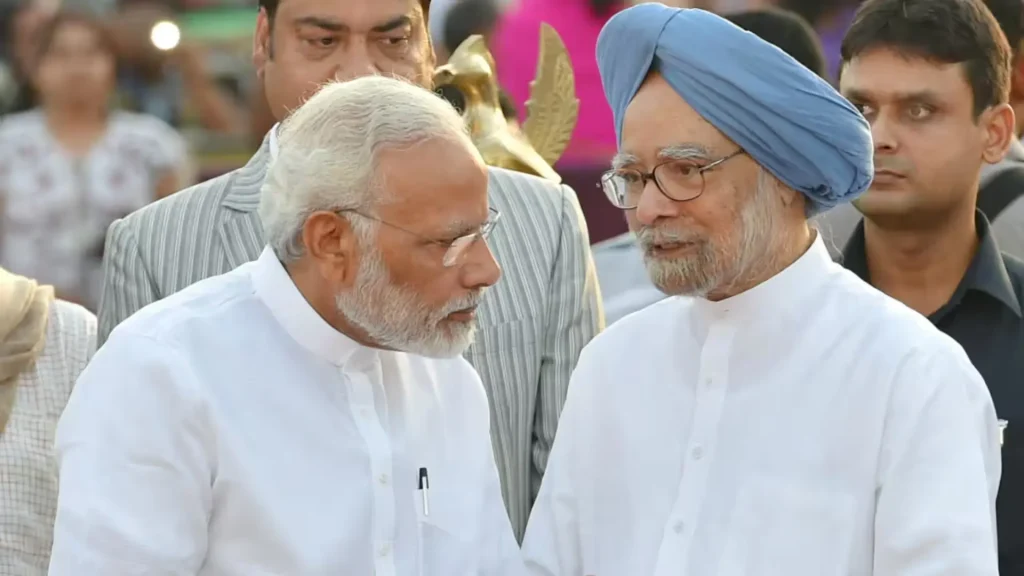Context:
The Union Cabinet passed a Condolence Resolution in memory of former Prime Minister Dr. Manmohan Singh, a key architect of India’s 1991 economic reforms, after his demise.
More on the News
- The Union Government has declared a state mourning for seven days till 1st January 2025.
- During the mourning period, the National Flag will be flown at half-mast across the country.
- Indian Missions and High Commissions abroad will also fly the National Flag at half-mast for seven days until January 1, 2025.
Early Life and Education:

- Born on September 26, 1932, in Gah, Punjab (now in Pakistan), his family migrated to India after the Partition in 1947.
- He completed his bachelor’s and master’s degrees from Panjab University (1952-54) and received his Tripos in Economics from the University of Cambridge in 1957.
- He obtained his D. Phil in economics from Nuffield College at Oxford University in 1962.
- His doctoral thesis focused on India’s export performance from 1951–1960.
- He worked with the UN Conference on Trade and Development (1966-69).
- He wrote India’s Export Trends and Prospects for Self-Sustained Growth (1964), which was an early critique of India’s inward-oriented trade policy.
Key Government Roles:
- Held positions such as Chief Economic Advisor (1972-76), Secretary of the Department of Economic Affairs (1976-80), and Chairman of the University Grants Commission (1991).
- As RBI Governor (1982–1985), he focused on financial stability and policy discipline.
- Following his stint at the Central Bank, he became the deputy chairman of the Planning Commission (1985-87).
- He also held the post of advisor to the PM of India on economic affairs (1990-91).
- He was first elected to the Rajysabha in 1991 by the Assam legislature.
- He was the leader of the opposition (LoP) in the Rajyasabha during 1998-2004.
- Internationally, he represented India at numerous high-profile conferences, including the Commonwealth Heads of Government Meeting (1993) and the World Conference on Human Rights (1993).
Role in 1991 Economic Reforms:
- When Manmohan Singh became Finance Minister in 1991, India was on the verge of economic collapse, with foreign exchange reserves sufficient to cover only a few weeks of essential imports.
- During the 1991 balance of payments crisis, he worked alongside the then Prime Minister P.V. Narasimha Rao to launch the LPG reforms (Liberalization, Privatization, and Globalization).
- Key reforms included devaluation of the rupee, dismantling the License Raj, and liberalizing foreign investment policies.
Prime Minister (2004–2014):
He served as India’s 14th Prime Minister, holding office for ten years.
He led India’s economic growth, with GDP growing at 8-9% annually during his first term.
- India achieved its highest GDP growth rate of 9% and became the second fastest-growing major economy in the world.
Managed India through the 2008 global financial crisis.
Key Legislation passed during his tenure:
- MGNREGA (2005), Right to Information Act (2005), National Rural Health Mission (2005)
- Right to Education Act (2009), National Food Security Act (2013), Land Acquisition Act (2013).
Foreign Policy contributions:
- He played a vital role in the India–United States Civil Nuclear Agreement (2008), which enabled civilian nuclear cooperation.
- The Nuclear Suppliers Group (NSG) grants a waiver to India during his tenure to commence civilian nuclear trade, making India the only country with nuclear weapons not party to the Non-Proliferation Treaty.
- He tried to end the border dispute with China, brokering a deal to reopen the Nathu La pass into Tibet which had been closed for more than 40 years.
- He continued the peace process with Pakistan, despite setbacks from attacks by Pakistani militants, including the Mumbai attack in November 2008.
Awards and Recognition:
- Among the many awards and honours conferred upon Dr. Manmohan Singh in his career, the most prominent are India’s second highest civilian honour, the Padma Vibhushan (1987), the Jawaharlal Nehru Birth Centenary Award of Indian Science Congress (1995), the Euro Money Award for Finance Minister of the year (1993).
- Outstanding Parliamentarian Award (2002)
- Adam Smith Prize (1956) and Wright’s Prize (1955) from Cambridge University.
- Order of King Abdulaziz (2010, Saudi Arabia), Order of the Paulownia Flowers (2014, Japan).

